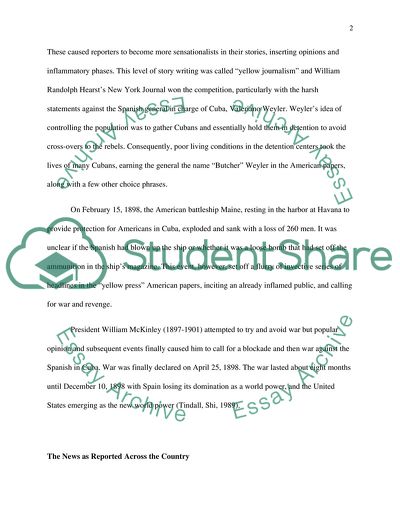Cite this document
(Viewpoint of the American People as Described by the American Coursework Example | Topics and Well Written Essays - 2250 words, n.d.)
Viewpoint of the American People as Described by the American Coursework Example | Topics and Well Written Essays - 2250 words. https://studentshare.org/military/1767073-use-the-library-of-congress-chronicling-america-website-to-compare-and-contrast-the-reaction-of-the-american-press-to-the-outbreak-of-the-spanish-american-war-your-examples-must-include-newspapers-from-new-york-district-of-columbia-minnesota-san-fran
Viewpoint of the American People as Described by the American Coursework Example | Topics and Well Written Essays - 2250 words. https://studentshare.org/military/1767073-use-the-library-of-congress-chronicling-america-website-to-compare-and-contrast-the-reaction-of-the-american-press-to-the-outbreak-of-the-spanish-american-war-your-examples-must-include-newspapers-from-new-york-district-of-columbia-minnesota-san-fran
(Viewpoint of the American People As Described by the American Coursework Example | Topics and Well Written Essays - 2250 Words)
Viewpoint of the American People As Described by the American Coursework Example | Topics and Well Written Essays - 2250 Words. https://studentshare.org/military/1767073-use-the-library-of-congress-chronicling-america-website-to-compare-and-contrast-the-reaction-of-the-american-press-to-the-outbreak-of-the-spanish-american-war-your-examples-must-include-newspapers-from-new-york-district-of-columbia-minnesota-san-fran.
Viewpoint of the American People As Described by the American Coursework Example | Topics and Well Written Essays - 2250 Words. https://studentshare.org/military/1767073-use-the-library-of-congress-chronicling-america-website-to-compare-and-contrast-the-reaction-of-the-american-press-to-the-outbreak-of-the-spanish-american-war-your-examples-must-include-newspapers-from-new-york-district-of-columbia-minnesota-san-fran.
“Viewpoint of the American People As Described by the American Coursework Example | Topics and Well Written Essays - 2250 Words”. https://studentshare.org/military/1767073-use-the-library-of-congress-chronicling-america-website-to-compare-and-contrast-the-reaction-of-the-american-press-to-the-outbreak-of-the-spanish-american-war-your-examples-must-include-newspapers-from-new-york-district-of-columbia-minnesota-san-fran.


